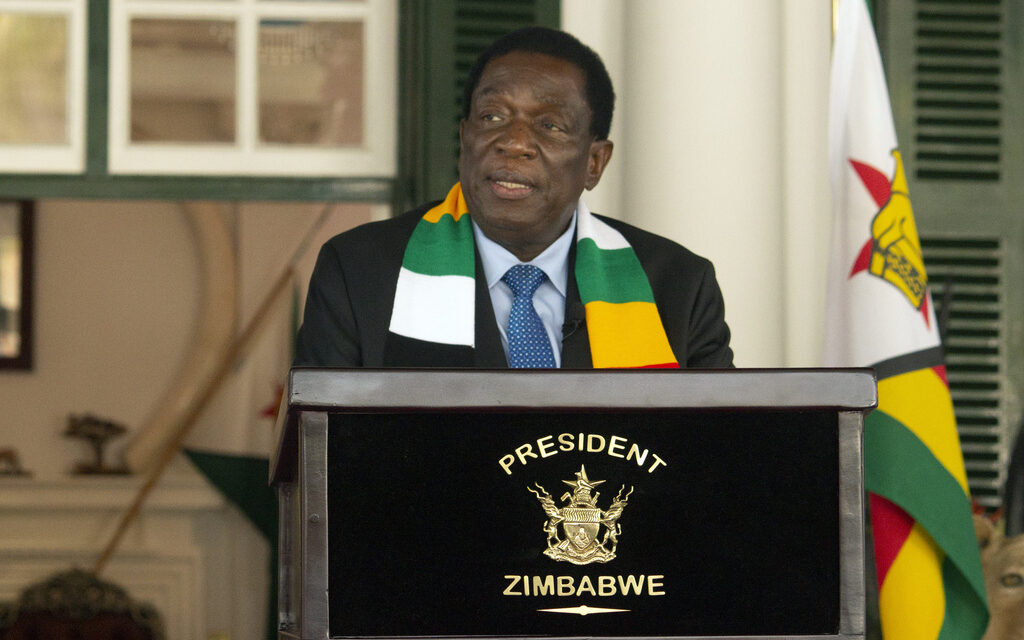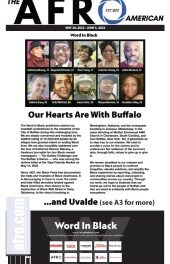By Farai Mutsaka and Gerald Imray
The Associated Press
HARARE, Zimbabwe (AP) — Zimbabwe’s main opposition leader on Aug. 27 alleged “blatant and gigantic fraud” in the country’s election after President Emmerson Mnangagwa was declared the winner and international observers reported an atmosphere of intimidation against voters.
The returns from the latest troubled vote in the southern African nation were announced the night of Aug. 26, two days earlier than expected. Opposition leader Nelson Chamisa’s Citizens Coalition for Change party said it would challenge the results as “hastily assembled without proper verification.”
“They stole your voice and vote but never your hope,” Chamisa wrote in a post on X, formerly known as Twitter, in his first public reaction to the election’s announced outcome. “It’s a blatant and gigantic fraud.”
People in the country of 15 million were bound to view the results with suspicion but Mnangagwa, 80, dismissed allegations of vote fraud.
“I did not conduct these elections. I think those who feel the race was not run properly know where to go to complain. I am so happy,” he said at a news conference Aug. 27, adding that the elections were run “transparently, fairly in broad daylight.”
Mnangagwa was reelected for a second and final five-year term with 52.6 percent of the vote, according to the Zimbabwe Electoral Commission. Chamisa, 45, who also lost to Mnangagwa in a very close and disputed election five years ago, won 44 percent of the vote this time, the commission said.
International election observers have noted problems with the election, held Aug. 23-24, citing an atmosphere of intimidation against Chamisa’s supporters. In the buildup to the vote, international rights groups reported a crackdown on opposition to Mnangagwa and the long-ruling ZANU-PF party.
“The vote will be challenged, it was fraught with unprecedented illegality,” Chamisa said later Aug. 27 in the capital, Harare. He described the results as “doctored” and “criminal.”
The rights groups said the party, which according to the electoral commission retained its parliamentary majority, had used the police and courts to harass and intimidate opposition officials and supporters.
Before the election, Chamisa alleged in an interview with The Associated Press that his party’s rallies had been broken up by police and his supporters had often been intimidated and threatened with violence.
The actual election was also problematic and voting was extended into an extra day Aug. 24 because of a shortage of ballot papers, especially in the capital and other urban areas that are opposition strongholds.
People slept at polling stations to make sure they were able to vote.
Mnangagwa’s victory meant ZANU-PF retained the governmental leadership it has held for all 43 years of Zimbabwe’s history since the nation was re-named following independence from White minority rule in 1980.
“This is a very happy occasion indeed,” said Ziyambi Ziyambi, an election agent for Mnangagwa and a Cabinet minister. “Zimbabweans have shown confidence in our president and ZANU-PF.”
Zimbabwe has a history of disputed and sometimes violent elections in the more than four decades of ZANU-PF rule, most notably under autocratic former president Robert Mugabe, who was leader for 37 years and oversaw a period of economic collapse that gained Zimbabwe international notoriety.
Mugabe’s regime also resulted in the United States and the European Union applying sanctions on Zimbabwe for alleged human rights abuses. Those sanctions are largely still in place.
Mugabe was removed from power in a military-led coup in 2017 and replaced with Mnangagwa, his former vice president. The coup was widely popular and celebrated as a new dawn, but while Mnangagwa promised an era of freedom and prosperity, critics have alleged the former guerrilla fighter nicknamed “the crocodile” has become as repressive as his predecessor.
Zimbabwe has had just those two leaders in more than four decades of independence.
The 2023 election results were released around 11.30 p.m. Aug. 26 at the official results center in Harare, taking many by surprise. They came just 48 hours after polls closed in the delayed elections, when election officials had planned to announce the results five days after voting ended.
“We reject any results hastily assembled without proper verification,” Promise Mkwananzi, a spokesperson for Chamisa’s CCC party, said minutes after the results were announced. “We will advise citizens on the next steps as the situation develops.”
While the outcome likely will be closely scrutinized, Chamisa’s party didn’t immediately announce if it would challenge them through the courts. Chamisa challenged his 2018 election loss to Mnangagwa, but that was rejected by the Constitutional Court.
The election observers said they had specific concerns in this vote over a ruling party affiliate organization called Forever Associates of Zimbabwe that they said set up tables at polling stations and took details of people walking into voting booths. The head of the African Union observer mission, former Nigerian President Goodluck Jonathan, said the FAZ activities should be declared “criminal offenses.”
More than 40 local vote monitors also were arrested on allegations of subversion that government critics said were trumped-up charges.
Ahead of the announcement of the results, dozens of armed police with water cannons guarded the national results center. It was the scene of deadly violence following the election five years ago, when soldiers killed six people during protests.
There was no sign of unrest early Aug. 27. Streets in Harare that would normally be bustling with late-night vendors were empty soon after the announcement Saturday night as people were digesting the results and another ZANU-PF victory, which would take the party’s rule to nearly half a century.Imray reported from Cape Town, South Africa.
HARARE, Zimbabwe (AP) — Zimbabwe’s main opposition leader on Aug. 27 alleged “blatant and gigantic fraud” in the country’s election after President Emmerson Mnangagwa was declared the winner and international observers reported an atmosphere of intimidation against voters.
The returns from the latest troubled vote in the southern African nation were announced the night of Aug. 26, two days earlier than expected. Opposition leader Nelson Chamisa’s Citizens Coalition for Change party said it would challenge the results as “hastily assembled without proper verification.”
“They stole your voice and vote but never your hope,” Chamisa wrote in a post on X, formerly known as Twitter, in his first public reaction to the election’s announced outcome. “It’s a blatant and gigantic fraud.”
People in the country of 15 million were bound to view the results with suspicion but Mnangagwa, 80, dismissed allegations of vote fraud.
“I did not conduct these elections. I think those who feel the race was not run properly know where to go to complain. I am so happy,” he said at a news conference Aug. 27, adding that the elections were run “transparently, fairly in broad daylight.”
Mnangagwa was reelected for a second and final five-year term with 52.6 percent of the vote, according to the Zimbabwe Electoral Commission. Chamisa, 45, who also lost to Mnangagwa in a very close and disputed election five years ago, won 44 percent of the vote this time, the commission said.
International election observers have noted problems with the election, held Aug. 23-24, citing an atmosphere of intimidation against Chamisa’s supporters. In the buildup to the vote, international rights groups reported a crackdown on opposition to Mnangagwa and the long-ruling ZANU-PF party.
“The vote will be challenged, it was fraught with unprecedented illegality,” Chamisa said later Aug. 27 in the capital, Harare. He described the results as “doctored” and “criminal.”
The rights groups said the party, which according to the electoral commission retained its parliamentary majority, had used the police and courts to harass and intimidate opposition officials and supporters.
Before the election, Chamisa alleged in an interview with The Associated Press that his party’s rallies had been broken up by police and his supporters had often been intimidated and threatened with violence.
The actual election was also problematic and voting was extended into an extra day Aug. 24 because of a shortage of ballot papers, especially in the capital and other urban areas that are opposition strongholds.
People slept at polling stations to make sure they were able to vote.
Mnangagwa’s victory meant ZANU-PF retained the governmental leadership it has held for all 43 years of Zimbabwe’s history since the nation was re-named following independence from White minority rule in 1980.
“This is a very happy occasion indeed,” said Ziyambi Ziyambi, an election agent for Mnangagwa and a Cabinet minister. “Zimbabweans have shown confidence in our president and ZANU-PF.”
Zimbabwe has a history of disputed and sometimes violent elections in the more than four decades of ZANU-PF rule, most notably under autocratic former president Robert Mugabe, who was leader for 37 years and oversaw a period of economic collapse that gained Zimbabwe international notoriety.
Mugabe’s regime also resulted in the United States and the European Union applying sanctions on Zimbabwe for alleged human rights abuses. Those sanctions are largely still in place.
Mugabe was removed from power in a military-led coup in 2017 and replaced with Mnangagwa, his former vice president. The coup was widely popular and celebrated as a new dawn, but while Mnangagwa promised an era of freedom and prosperity, critics have alleged the former guerrilla fighter nicknamed “the crocodile” has become as repressive as his predecessor.
Zimbabwe has had just those two leaders in more than four decades of independence.
The 2023 election results were released around 11.30 p.m. Aug. 26 at the official results center in Harare, taking many by surprise. They came just 48 hours after polls closed in the delayed elections, when election officials had planned to announce the results five days after voting ended.
“We reject any results hastily assembled without proper verification,” Promise Mkwananzi, a spokesperson for Chamisa’s CCC party, said minutes after the results were announced. “We will advise citizens on the next steps as the situation develops.”
While the outcome likely will be closely scrutinized, Chamisa’s party didn’t immediately announce if it would challenge them through the courts. Chamisa challenged his 2018 election loss to Mnangagwa, but that was rejected by the Constitutional Court.
The election observers said they had specific concerns in this vote over a ruling party affiliate organization called Forever Associates of Zimbabwe that they said set up tables at polling stations and took details of people walking into voting booths. The head of the African Union observer mission, former Nigerian President Goodluck Jonathan, said the FAZ activities should be declared “criminal offenses.”
More than 40 local vote monitors also were arrested on allegations of subversion that government critics said were trumped-up charges.
Ahead of the announcement of the results, dozens of armed police with water cannons guarded the national results center. It was the scene of deadly violence following the election five years ago, when soldiers killed six people during protests.
There was no sign of unrest early Aug. 27. Streets in Harare that would normally be bustling with late-night vendors were empty soon after the announcement Saturday night as people were digesting the results and another ZANU-PF victory, which would take the party’s rule to nearly half a century.
___
Imray reported from Cape Town, South Africa.
The post Zimbabwe’s opposition alleges ‘gigantic fraud’ in vote that extends the ZANU-PF party’s 43-year rule appeared first on AFRO American Newspapers .










